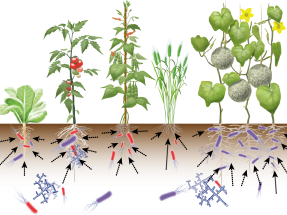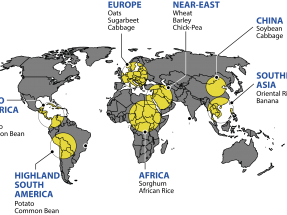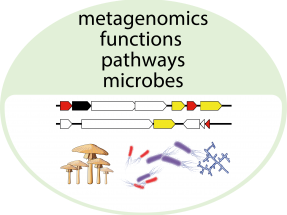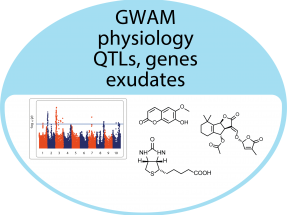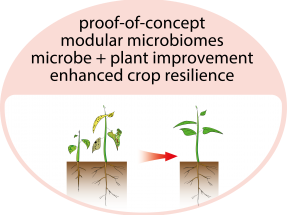MiCRop research
We are facing key societal problems of the 21st century, in particular increased global demand for crops that are more resilient to (a)biotic stress and less dependent on fertilisiers and pesticides. The aim of MiCRop is to tackle these with a global vision. To achieve this goal, we have developed an ambitious multi-disciplinary research programme with the following approach:
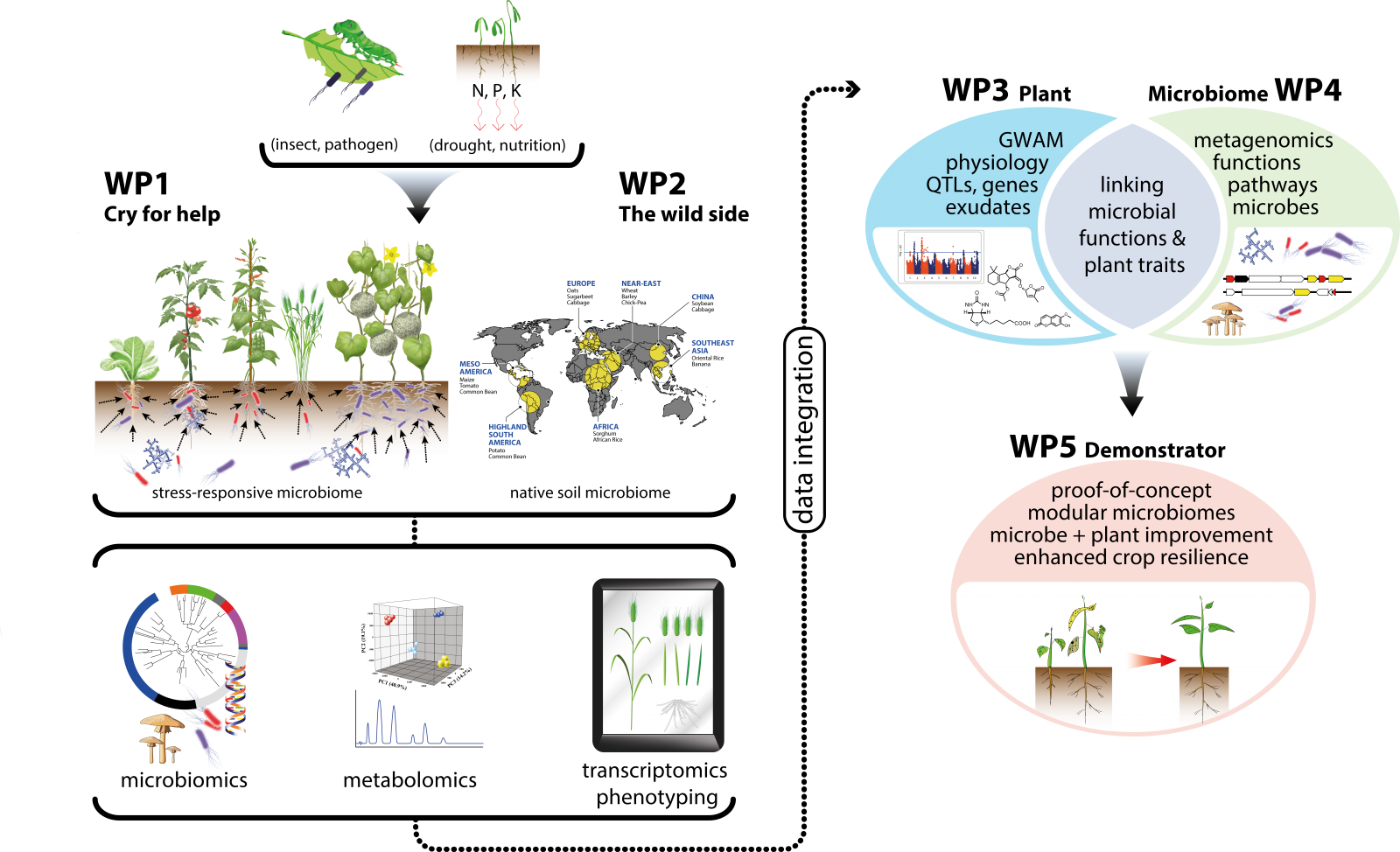
Research themes
WP1: Cry for help: stress-induced microbiome recruitment across the plant kingdom
Studying the evolution of plant-recruited root microbiomes across the plant kingdom
WP2: Walk on the wild side of plant microbiomes
Investigating how microbiome recruitment and functionality change when plants are grown in soils at their centres of origin
WP3: Digging deep: Mechanisms and plasticity of stress-induced microbiome recruitment
Elucidating the mechanisms by which plants selectively recruit their microbiome under conditions of environmental stress
WP4: Digging deeper: Microbiome functions facilitating plant stress resilience
Exploring the functional basis of microbial mechanisms that facilitate plant stress resilience
WP5: Demonstrator: Harnessing the plant microbiome for stress-resilient future crops
Translating findings to future application in a microbiome-assisted agricultural context
Research projects
Mechanisms underlying plant-root microbiome recruitment under stress
Sébastien Jaupitre studies the evolution of root-associated microbe recruitment and mechanisms underlying microbiome recruitment specific to the Cucurbitaceae family.
Stress induced long-distance communication between plant and microbes
Muhammad Rizaludin aims at elucidating the mechanism underlying biotic-stress induced plant-microbe communication belowground via root-emitted volatile organic compounds.
Stress-induced microbiome assembly in Solanaceae in their centres of origin
Dario X. Ramirez-Villacis characterises the stress-induced assembly of the root microbiome of wild and domesticated potatoes in native and agricultural soils in the centre of origin (Ecuador).
Microbe-drought/insect-plant interaction
Zulema Carracedo Lorenzo aims at identifying plant pathways of stress alleviating microorganism recruitment that could be targeted in plant breeding programs.
Evolution of stress-induced microbiome recruitment of legumes
Malin Klein studies the evolution of root microbiome recruitment in response to biotic and abiotic stress in wild and cultivated species.
Mechanisms of root microbiome recruitment under drought stress in Solanaceae/tomato
Roland Berdaguer aims at elucidating the mechanisms by which plants of the Solanaceae family, and more specifically tomato, recruit soil microbes that promote the plants’ resilience to drought stress.
Phylogenetic approach of Brassicaceae microbiome recruitment in response to insect stress
Marcela Aragón Gómez is building a comprehensive understanding of the evolution of belowground "cry for help" strategies of the Brassicaceae family in response to insect stress, and identifiying stress-induced core microbiome.
Evolutionary Biogeography of Underground Microbial Networks
Justin Stewart explores the global evolutionary biogeography of underground networks and how microbial communities assemble.
Interplay between the plant defense system and the root-associated microbiome during stress
Melissa Uribe Acosta investigates how defence-related compounds in plants influence the assembly and activity of the rhizosphere and endosphere microbiome.
Deciphering the impact of domestication on the tomato root microbiome
Stalin Sarango-Flores studies the the microbial community composition of the rizophere in tomato and how genetic features impact the associated microbiome.
Genetic variation in recruitment of beneficial soil microorganisms to combat insect herbivory in cabbage
Kris de Kreek aims to elucidate the intraspecific genetic variation in Brassica oleracea in attracting beneficial soil microorganisms upon herbivore attack to enhance defence against herbivorous insects.
Microbial recruitment by tomato and potato roots under nutrient deficiency
Davar Abedini investigates microbial recruitment by tomato/potato root under nitrogen deficiency to unravel potato-microbes-PCNs chemical communications.
Effect of seed microbiome on seed germination and seedling vigor
Sasiwimon Siricharoen studys the influence of maternal environment including different soil types and habitats on microbial communities of Arabidopsis thaliana seeds across different generations, and how these seed microbiome improve abiotic stress (drought and salt) tolerance during seed germination and seedling establishment.

